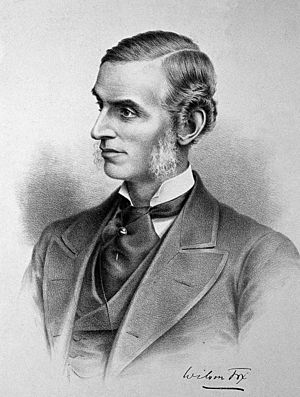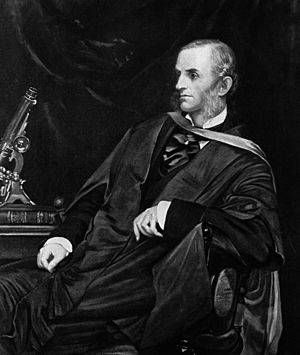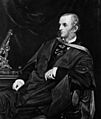Wilson Fox facts for kids
Wilson Fox (born November 2, 1831 – died May 3, 1887) was an important English doctor. He was known for his work in medicine and for teaching future doctors.
Contents
Early Life and Education
Wilson Fox was born in a place called Tone Dale House in Wellington, Somerset. His family were Quakers, a type of Christian group, and his father was a manufacturer. Even though he didn't live at Tone Dale House, he visited it many times.
He went to school at Bruce Castle School in Tottenham. Later, he studied at University College, London. He earned several degrees there: a Bachelor of Arts (B.A.) in 1850, a Bachelor of Medicine (M.B.) in 1854, and a Doctor of Medicine (M.D.) in 1855.
Medical Training and Studies
After finishing his studies in London, Wilson Fox spent a year working as a house physician at the Edinburgh Royal Infirmary. This means he was a doctor living at the hospital.
He then traveled to other European cities like Paris, Vienna, and Berlin to learn more about medicine. For two years in Berlin, he studied with a very famous pathologist named Rudolf Virchow. A pathologist is a doctor who studies diseases. While working with Virchow, Fox made important discoveries about how stomach glands can break down.
Medical Career and Achievements
In 1859, Wilson Fox married Emily Doyle. They settled in Newcastle-under-Lyme, where he became a doctor at the North Staffordshire Royal Infirmary.
Becoming a Professor
In 1861, with a strong recommendation from Rudolf Virchow, Wilson Fox was chosen to be a professor at University College, London. He taught about pathological anatomy, which is the study of how diseases change the body's structure. Soon after, he also became an assistant doctor at University College Hospital.
By 1866, he became a fellow of the Royal College of Physicians. This is a special honor for doctors. In 1867, he became a full doctor at his hospital and the Holme Professor of Clinical Medicine. This meant he was teaching and practicing medicine at a high level.
Doctor to the Queen
In 1870, Wilson Fox was given a very special role: he became a physician extraordinary to Queen Victoria. This meant he was one of the Queen's doctors. He was also elected a Fellow of the Royal Society, which is a group of top scientists. Later, he became a physician in ordinary to the Queen, meaning he was a regular doctor for her and often attended her when she was in Scotland.
He became a very busy doctor with many patients. He was also an active member of important medical groups and the College of Physicians.
Personal Qualities and Teaching Style
Wilson Fox was a tall, thin, and upright man with a kind face. Even though he was a bit quiet, people trusted him because he was sincere and serious about his work. He was also a very kind person. He often let the Bishop of Bedford use his house in Rydal during the summer. This was so sick clergymen and their families from East London could have a place to rest.
A Great Teacher and Researcher
Wilson Fox was highly respected as both a teacher and a researcher. He studied his patients' cases very carefully, paying close attention to their feelings and thoughts. This made his patients feel very confident in him.
He was one of the first doctors to save lives in cases of rheumatic fever where the patient's body temperature was dangerously high. He did this by putting the patient in baths of iced water to cool them down.
His lectures were very popular with students. He was good at showing how understanding diseases (pathology) could help doctors diagnose and treat patients in real life. All his writings showed a lot of research and hard work. He was working on a big book about lung diseases and an atlas of their pathology when he died.
Later Life and Legacy
In April 1887, Wilson Fox had to go to Wellington, Somerset because his oldest brother was dying. After that, he headed north to his home in Rydal for a rest. However, he became sick with pneumonia on the way and died on May 3 in Preston, Lancashire. He was buried in Taunton on May 6, 1887. A statue of him was put in the Shire Hall in Taunton in 1888.
His first wife died in 1870. They had three sons and three daughters. In 1874, he married Evelyn, who was the daughter of Sir Baldwin Wake Walker and the widow of Captain Burgoyne.
His second son, Henry Wilson-Fox (1863–1921), became a director of many companies in Rhodesia and a Member of Parliament (MP) for the Conservative Party.
Images for kids
 | Audre Lorde |
 | John Berry Meachum |
 | Ferdinand Lee Barnett |





